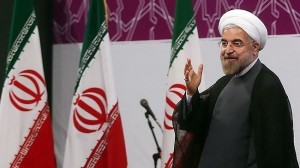 A month after Iran’s historic presidential elections, the Obama administration is still waiting for a clear signal from Tehran on whether the change in leadership will translate into progress toward solving the Iranian nuclear crisis, officials said Friday.
A month after Iran’s historic presidential elections, the Obama administration is still waiting for a clear signal from Tehran on whether the change in leadership will translate into progress toward solving the Iranian nuclear crisis, officials said Friday.
U.S. diplomats will confer with counterparts from five other world powers next week in the first strategy session on Iran since the June 14 upset victory by Hassan Rouhani, who campaigned on a pledge to increase Iran’s engagement with the outside world.
Notably absent from the attendees list is Iran itself, which has deferred any decisions on new nuclear talks until after Rouhani is formally sworn in next month. U.S. officials say they have received no substantive communication from Iranian leaders since the election that would portend a change in Iran’s nuclear policies or its approach to negotiations.
While awaiting Rouhani’s official ascent to the presidency, the White House has publicly expressed a willingness to hold direct talks with the new government, while also seeking to preserve and even toughen the economic sanctions that have battered Iran’s economy and fueled popular support for Rouhani. A new round of sanctions that went into effect June 2 is expected to make it harder for Iran to collect hard currency for the oil that it manages to sell abroad.
“We are conceivably in a whole new place,” a senior administration official said in a briefing for reporters ahead of the U.S. diplomatic team’s departure for the strategy meeting in Brussels. The official, who insisted on anonymity in discussing sensitive diplomacy, noted that Iran’s nuclear policy is primarily controlled by the country’s supreme leader, Ayatollah Ali Khamenei, who has not publicly endorsed Rouhani’s pronouncements suggesting a new flexibility in Iran’s dealings with the West.
“We don’t know whether the supreme leader has changed his views about how to proceed,” the official said. “We don’t know what role Rouhani will play or how much he will be connected to this process. Those are all a lot of things we have to understand.”
Rouhani, widely regarded as a dark-horse candidate before his landslide victory over a field of more conservative candidates, has given several speeches since the election reiterating his promise to increase individual freedoms and revive Iran’s struggling economy, which has staggered under international sanctions that have cut deeply into Iran’s oil exports. In a speech two weeks ago, he called for a new moderation in the country’s diplomatic affairs.
“Moderation in foreign policy is neither surrender nor conflict, neither passivity nor confrontation,” Rouhani said. “Moderation is effective and constructive interaction with the world.”
But while the president-elect’s tone has rekindled hopes for a nuclear agreement, administration officials say they remain wary, given Iran’s history of negotiations to stall for time while the country’s nuclear program continues to advance.
“People should not take their eye off of the fact that Iran continues to move forward with its nuclear program,” one of the senior administration officials said. “And that makes reaching a diplomatic solution more pressing every day.”
By The Washington Post
The Iran Project is not responsible for the content of quoted articles.

 QR code
QR code